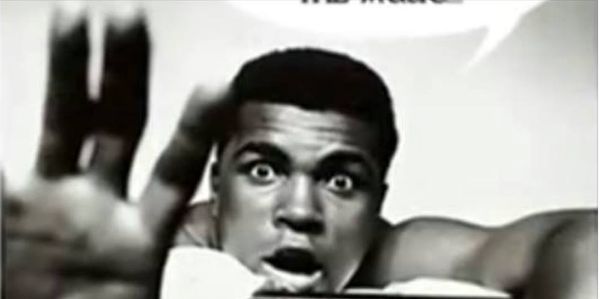I’ve been uneasy that the praise heaped on Muhammad Ali over the last week has been so uncritical, simplifying the story of a much more complicated man. Quaker writer/activist Tom Ewell reminds us that there were times when Ali was no saint, yet rose to become the icon of courageous truth-telling and civil disobedience we honor today. Ewell's eulogy acknowledges the full length of Ali's difficult and brave journey.—John Graham.
As a young man, Muhammad Ali captured our attention as much by his in-your-face bluster as his athletic feats.
Then somewhere in his soul he crossed the line over to speaking out on behalf of something greater than himself. Was it because he had so much self-confidence, charisma, intelligence, wit, and good looks that he could afford to develop an attitude of altruism and thus just tell the truth? Beneath all the cruelty of his boxing career, and all the bluster was also a person of conscience that could clearly in language we could all understand pronounce the truth about racism, war, and the exploitation of the poor. And most interesting of all, behind all his self promotion he was willing to actually pay a considerable personal price for living out his moral convictions, a choice he didn’t have to make. And this is the point which wins my admiration.
I remember sitting in a barbershop the day that Ali refused induction in the army. Already a pariah because of his brashness, ego, and his conversion to Islam, he then goes the final straw by being “unpatriotic.” But paradoxically, of course, some part of us in that barbershop, even then, knew he was telling the truth - the Vietnam war was a disastrous, hypocritical folly given we were supposed to be freeing up people in Asia from oppression when we were so full of oppression right here in America with our culture of Jim Crow and neglect of the poor. It is worth noting that in Ali’s courageous stand against induction and the war, he provided some of the encouragement and cover for Martin Luther King, Jr. to later use similar language and to take a similar position in his speech against the Vietnam war on April 4, 1967.
All this brings me to a point of gratitude: Whatever the final word on Ali’s “greatness” he will for ever be admired and respected for not only having the courage to speak out against injustice, he was willing to back it up with self-sacrifice and he provides for us today such a surprising example of the importance of truth telling. Who would have thought then that he would be lionized this week in a three hour, broadcast memorial service that honored him so deeply.
So what are the issues we need to confront “Ali style” today? How many of us speak out against our perpetual war and its cost to the men and women traumatized by their involvement, the death and destruction it creates, the waste and fraud of the Pentagon and the war profiteers? The familiar list goes on: how often do we hear the truth regarding the injustice of the number of people in prison in the U.S., the homeless and hungry, the proliferation of guns, the neglected health care for our children and elders?
The good news, it seems, is that the voices of conscience and resistance are being raised with increasing intensity in the U.S. and across the globe, likely by many or most of those reading these words. But what makes Ali’s witness truly ennobling is that he was willing to be sacrificially accountable for supporting his convictions, and perhaps even more admirably, by his willingness to be seen as so weak and fallible in his later years as he suffered from Parkinson’s disease. There are lessons here that I think we need to study more carefully and learn from and emulate. What level of sacrifice and vulnerability are we capable of in our own witness against injustice? Among the take-aways of the Muhammad Ali story and its front page coverage is that ultimately the world does honor courageous truth telling and service, especially if it is combined (ultimately in Ali’s case) with humility, grace, vulnerability and sacrifice.
A global program based on Whidbey Island, the Giraffe Heroes Project, honors this kind of courageous witness from people throughout the world, and there are thousands and thousands of others who are also among those who could make that claim.
Among Ali’s various “titles” perhaps his more fitting and memorable one would the title of “humanitarian.”
Whether of not he was the "Greatest Humanitarian,” he has left his mark on American history and in our hearts.
Tom Ewell
Tom Ewell is a writer, and peace activist living on Whidbey Island, WA. To receive his own weekly essays ("Saturday Evening Posts") send your request to tewell@whidbey.com

